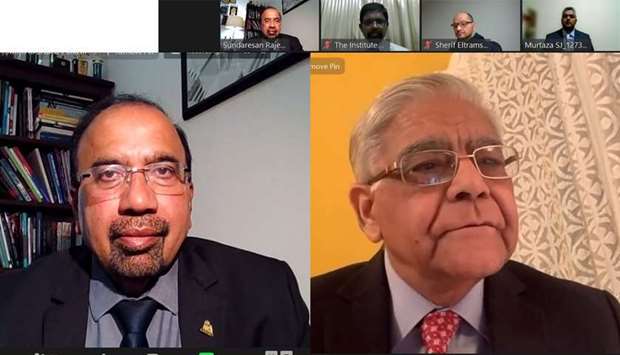The value and advantages of cost rationalisation was at the main topic of a webinar conducted recently by the Institute of Internal Auditors (IIA) Qatar chapter with industry expert, Narendra K Aneja, as main speaker
Aneja, a former global board member of the IIA and the chief executive of Aneja Associates, delivered a presentation titled 'Covid-19: A Framework for Cost Rationalisation'.
The firm conducts governance studies, risk assessments, management, and operational audits of over 100 companies in India and abroad. Aneja holds an MBA from The Wharton School (1979), is a Tata Scholar and was ranked on the Director's List at Wharton (1978).
"Almost every country in the world has been hit hard by Covid-19, with its impact is unprecedented. Most Companies have responded by temporary or permanent workforce reductions and making cuts in discretionary spending. But there are many ways for cost rationalization besides job cuts, and management expects internal auditors to play a role to build strategic, low-cost capability," he said.
On the impact of Covid-19 on Qatar, Aneja cited a statement from HE the Minister of State for Energy Affairs and Qatar Petroleum CEO Saad bin Sherida al-Kaabi about “looking to reduce operating costs and Capex." “The GDP growth rate is expected to fall to -4.3% in 2020; still, it will grow to 5% in 2021, ahead of 2022FIFA World Cup.”
The framework for cost rationalisation was elaborated based on Aneja’s expertise from professional practice. He said the first recommendation was to consolidate activities and innovate, which means a review existing business models to explore opportunities for consolidation and innovation across functions, locations, and materials. Many tips are given as takeaways to implement, he said.
He said the next aspect of the cost rationalisation framework is to digitise processes for efficiencies and automate controls for robustness. The recommendations were digital sales channels, RPA software, supplier onboarding, customer support and chatbots, HR assistance, and use drones for inventory verification, among others.
“Look for economies in buying by finding opportunities to curb leakages and improve procurement practices for goods and services. Spend analysis, vendor analysis, and contract process analysis are broad areas to bring further improvements,” Aneja stated.
He said the other areas are making logistics leaner by reducing wasteful activities and increasing the supply chain and logistics efficiencies. One important area is to build tighter controls in areas that result in cost advantages, he said.
“Defer avoidable expenditure,” said Aneja, who strongly recommended postponing non-essential and non-core expenditure as much as possible. Operating and capital expenditure should be monitored and managed to curb costs, he continued.
"Aneja's presentation's final takeaways were look for cost rationalisations and institutionalize them, automate or digitise maximum processes and operations, and banish waste and inefficiencies, however small. The most powerful statement was that cost rationalisation is a path to a company's competitive advantage," said Sundaresan Rajeswar, board member.
Internal Auditors are waiting for the upcoming book by Richard Chambers, president of the IIA Global. The book 'Agents of Change: Internal Auditors in an Era of Disruption' is an outstanding guide for all internal auditors to plan their trajectories to become "catalysts for transformation" and enhance their organizations' value.
Fahad al-Marri, senior vice president of the IIA Qatar, addressed the gathering, while Muralikrisha introduced the speaker, and Girish Jain and Murtaza hosted the meeting.

